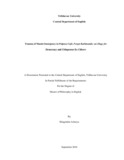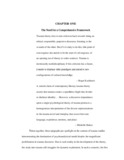Please use this identifier to cite or link to this item:
https://elibrary.tucl.edu.np/handle/123456789/321| Title: | Trauma of Maoist Insurgency in Palpasa Café, Forget Kathmandu: an Elegy for Democracy and Chhapamar Ko Chhoro |
| Authors: | Acharya, Khagendra |
| Keywords: | M.Phil.;Psycho analysis |
| Issue Date: | 2010 |
| Publisher: | Central Department of English |
| Abstract: | The rendition of trauma is a complex and fallible process: a phenomenon pertinently acknowledged but inappropriately accounted in trauma studies. Mainly due to the orientation of the existing postulations on trauma in unidirectional causation, any of the theory does not account comprehensively why there is diverse narrative of any traumatic event. Consequently, trauma critics show the trajectory of adherence to any particular theory that postulates the cause in terms of biological mechanism or social constraints or cultural necessities. The dissertation proposes a framework developed from Gerbner’s communication model not only to intersect with trauma theory but also to account for all the contingent factors. The model comprises two axes – one, the perceptual and the other, means and control. Together the axes have availability, context, selection, access to channel and media discourse control as the variables of trauma process. The dissertation argues that the analysis of any text through this framework comprehensively accounts for the factors that determine trauma rendition. The texts studied here include Palpasa Café, Forget Kathmandu: an Elegy for Democracy and Chhapamar ko Chhoro [Son of a Guerrilla]. The study of these texts provides logical basis to the argument as the analysis demonstrates that the diversity in the narration emerges as a consequence of availability, context, selection, access to channel and media discourse control. |
| URI: | http://elibrary.tucl.edu.np:8080/jspui/handle/123456789/321 |
| Appears in Collections: | English |
Files in This Item:
| File | Description | Size | Format | |
|---|---|---|---|---|
| cover.pdf | 54.89 kB | Adobe PDF |  View/Open | |
| chapter.pdf | 790.43 kB | Adobe PDF |  View/Open |
Items in DSpace are protected by copyright, with all rights reserved, unless otherwise indicated.
